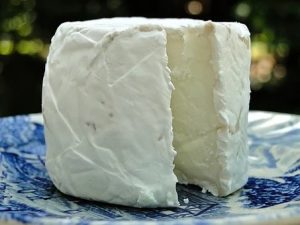Written by Jessica Patella, ND. Consumption of goat cheese naturally enriched in polyunsaturated fatty acids and conjugated linolenic acids for twelve weeks significantly increased high density lipoprotein (HDL) and significantly decreased C-reactive protein.
 Cardiovascular disease is the leading cause of death worldwide, with obesity, elevated cholesterol levels and smoking being major risk factors 1,2. Current recommendations include exercise and diet modification for cardiovascular disease 1,2. Omega-3 fatty acid is a key component of a healthy diet to increase good cholesterol levels, decrease inflammation and decrease the risk of clots 1,3. Yet the standard American diet has an unhealthy ratio of omega-6 to omega-3 fats. With full fat dairy considered a risk factor for cardiovascular health, researchers evaluated the effects of goat dairy on cardiovascular disease 1,4.
Cardiovascular disease is the leading cause of death worldwide, with obesity, elevated cholesterol levels and smoking being major risk factors 1,2. Current recommendations include exercise and diet modification for cardiovascular disease 1,2. Omega-3 fatty acid is a key component of a healthy diet to increase good cholesterol levels, decrease inflammation and decrease the risk of clots 1,3. Yet the standard American diet has an unhealthy ratio of omega-6 to omega-3 fats. With full fat dairy considered a risk factor for cardiovascular health, researchers evaluated the effects of goat dairy on cardiovascular disease 1,4.
More recently scientists have started modulating foods, in attempt to enrich foods that are regularly consumed by the population. By altering an animal’s diet it is relatively easy to modulate the fatty acid composition of the milk the animal produces. By increasing an animal’s access to oilseeds rich in omega-3 oils, the milk then also becomes richer in omega-3 oils 1,5.
The research included 68 overweight and obese participants (52 women, 16 men), with at least two risk factors for cardiovascular disease in their lipid panels 1. The participants were randomly assigned to either a commercial goat cheese group (CG, 60g/day, n=36) or a goat cheese naturally enriched with omega-3 and conjugated linolenic acid (EG, 60g/day, n=32) for 12 weeks. All participants were prescribed an individualized balanced hypocaloric diet of approximately 400kcal/day restriction 1.
The results were as follows:
- Both groups lost on average about 7.7 pounds (-3.41 +/- 3.13 CG and -3.66 +/- 2.46 kg EG) but there was no significant weight difference between groups.
- The group consuming naturally enriched omega-3 goat cheese significantly increased HDL “good” cholesterol levels (p<0.05) and significantly decreased C-reactive protein levels (a marker of inflammation in the body) by 36% compared to the control goat cheese group (p<0.05).
- Consumption of goat cheese did not alter the LDL “bad” cholesterol in either group.
- Both groups saw a reduced waist circumference of about 5.8 cm (-5.74 +/- 6.63 CG and -5.87 +/- 3.18 cm EG) although the difference between groups was not significant.
In conclusion, the consumption of goat cheese, both controlled and enriched, along with a balanced hypocaloric diet did result in weight and waist reduction. Additionally, significant increase of HDL “good” cholesterol and the decrease of inflammatory marker C-reactive protein, suggests consuming omega-3 rich goat cheese could improve the state of health 1. Future research should consider an additional control group without goat cheese consumption and a larger population base.
Source: Santurino, Cristina, Bricia López-Plaza, Javier Fontecha, María V. Calvo, Laura M. Bermejo, David Gómez-Andrés, and Carmen Gómez-Candela. “Consumption of Goat Cheese Naturally Rich in Omega-3 and Conjugated Linoleic Acid Improves the Cardiovascular and Inflammatory Biomarkers of Overweight and Obese Subjects: A Randomized Controlled Trial.” Nutrients 12, no. 5 (2020): 1315.
© 2020 by the authors. Licensee MDPI, Basel, Switzerland. This article is an open access article distributed under the terms and conditions of the Creative Commons Attribution (CC BY) license (http://creativecommons.org/licenses/by/4.0/).
Click here to read the full text study.
Posted July 20, 2020.
References:
- Santurino C, López-Plaza B, Fontecha J, et al. Consumption of Goat Cheese Naturally Rich in Omega-3 and Conjugated Linoleic Acid Improves the Cardiovascular and Inflammatory Biomarkers of Overweight and Obese Subjects: A Randomized Controlled Trial. Nutrients. 2020;12(5).
- DiNicolantonio JJ, Lucan SC, O’Keefe JH. The Evidence for Saturated Fat and for Sugar Related to Coronary Heart Disease. Progress in cardiovascular diseases. 2016;58(5):464-472.
- de Goede J, Geleijnse JM, Ding EL, Soedamah-Muthu SS. Effect of cheese consumption on blood lipids: a systematic review and meta-analysis of randomized controlled trials. Nutr Rev. 2015;73(5):259-275.
- Fontecha J, Calvo MV, Juarez M, Gil A, Martínez-Vizcaino V. Milk and Dairy Product Consumption and Cardiovascular Diseases: An Overview of Systematic Reviews and Meta-Analyses. Advances in nutrition (Bethesda, Md). 2019;10(suppl_2):S164-s189.
- Dittrich M, Jahreis G, Bothor K, et al. Benefits of foods supplemented with vegetable oils rich in α-linolenic, stearidonic or docosahexaenoic acid in hypertriglyceridemic subjects: a double-blind, randomized, controlled trail. Eur J Nutr. 2015;54(6):881-893.

